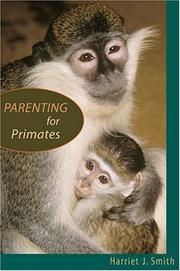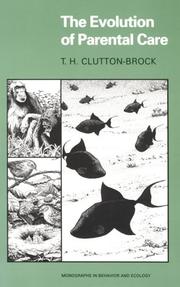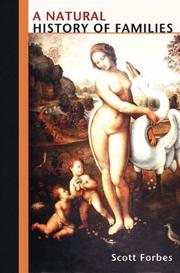| Listing 1 - 10 of 14 | << page >> |
Sort by
|
Book
ISBN: 9783030977627 Year: 2022 Publisher: Cham Springer International Publishing :Imprint: Springer
Abstract | Keywords | Export | Availability | Bookmark
 Loading...
Loading...Choose an application
- Reference Manager
- EndNote
- RefWorks (Direct export to RefWorks)
Mammals --- Parental behavior in animals. --- Behavior. --- Care of the young (Animal behavior) --- Maternal behavior in animals --- Parental care in animals --- Parenting in animals --- Paternal behavior in animals --- Paternalism in animals --- Animal behavior --- Cooperative breeding in animals
Book
ISBN: 1316490408 1316490629 1107338352 1316491943 131649084X 1316491064 1316489086 9781107338357 9781316491942 9781316491065 9781316491720 1316491722 9781107043435 1107043433 9781107642126 Year: 2016 Publisher: Cambridge
Abstract | Keywords | Export | Availability | Bookmark
 Loading...
Loading...Choose an application
- Reference Manager
- EndNote
- RefWorks (Direct export to RefWorks)
Cooperative breeders are species in which individuals beyond a pair assist in the production of young in a single brood or litter. Although relatively rare, cooperative breeding is widespread taxonomically and continues to pose challenges to our understanding of the evolution of cooperation and altruistic behavior. Bringing together long-term studies of cooperatively breeding birds, mammals, and fishes, this volume provides a synthesis of current studies in the field. The chapters are organised by individual studies of particular species or (in the case of mole-rats) two closely related cooperatively breeding species. Each focuses not only on describing behavior and ecology but also on testing evolutionary hypotheses for the form and function of the diverse and extraordinary cooperative breeding lifestyles that have been discovered. This unique and comprehensive text will be of interest to graduate students and researchers of behavioral ecology and the evolution of cooperation.
Parental behavior in animals. --- Animal societies. --- Social behavior in animals --- Care of the young (Animal behavior) --- Maternal behavior in animals --- Parental care in animals --- Parenting in animals --- Paternal behavior in animals --- Paternalism in animals --- Animal behavior --- Cooperative breeding in animals
Multi
ISSN: 21628823 ISBN: 0120045257 9780120045259 Year: 1965 Volume: 42 Publisher: New York, NY : Academic Press
Abstract | Keywords | Export | Availability | Bookmark
 Loading...
Loading...Choose an application
- Reference Manager
- EndNote
- RefWorks (Direct export to RefWorks)
Advances in the Study of Behavior was initiated over 40 years ago to serve the increasing number of scientists engaged in the study of animal behavior. That number is still expanding. This thematic volume makes another important ""contribution to the development of the field"" by bringing together material that aggregates studies conducted on the behavior of tropical animals. Advances in the Study of Behavior is now available online at ScienceDirect--full-text online from volume 30 onward.
Parental behavior in animals --- Care of the young (Animal behavior) --- Maternal behavior in animals --- Parental care in animals --- Parenting in animals --- Paternal behavior in animals --- Paternalism in animals --- Animal behavior --- Cooperative breeding in animals --- Animal behavior. --- Human behavior. --- Psychology, Comparative. --- Behavior. --- Animaux --- Comportement humain --- Psychologie comparée --- Mœurs et comportement --- Maternal Behavior --- Paternal Behavior --- Animals
Book
ISBN: 9512916118 Year: 1999 Publisher: Turku : Turun Yliopisto,
Abstract | Keywords | Export | Availability | Bookmark
 Loading...
Loading...Choose an application
- Reference Manager
- EndNote
- RefWorks (Direct export to RefWorks)
Animals as parents --- Animaux [Comportement parental chez les ] --- Care of the young (Animals) --- Comportement parental chez les animaux --- Dieren [Ouderlijk gedrag bij de ] --- Maternal behavior in animals --- Ouderlijk gedrag bij de dieren --- Parental behavior in animals --- Paternal behavior in animals --- Goldeneye --- Reproduction (Biology) --- Behavior --- Oiseaux --- Reproduction --- Moeurs et comportement
Book
ISBN: 1281762458 9786611762452 0080559573 0123742854 9780123742858 9780080559575 Year: 2008 Publisher: Burlington, MA : Elsevier/Academic Press,
Abstract | Keywords | Export | Availability | Bookmark
 Loading...
Loading...Choose an application
- Reference Manager
- EndNote
- RefWorks (Direct export to RefWorks)
This book presents cutting edge research on the basic neurobiology of parental behavior as it relates to behavioral disorders, including postpartum depression, anxiety, and inadequate parental bonding to infants. Internationally recognized basic and clinical researchers present new research findings in humans and animals that elucidate the roles of the brain, physiological state, genes and environment in maternal and paternal care. By bridging the gap between basic and clinical research, new understandings of how the biology of the brain and the reproductive state of the parent impact their me
Parental behavior in animals --- Animal behavior --- Physiological aspects. --- Animals --- Animals, Habits and behavior of --- Behavior, Animal --- Ethology --- Animal psychology --- Zoology --- Ethologists --- Psychology, Comparative --- Care of the young (Animal behavior) --- Maternal behavior in animals --- Parental care in animals --- Parenting in animals --- Paternal behavior in animals --- Paternalism in animals --- Cooperative breeding in animals --- Behavior

ISBN: 0674043804 9780674043800 9780674019386 0674019385 0674019385 Year: 2009 Publisher: Cambridge, MA
Abstract | Keywords | Export | Availability | Bookmark
 Loading...
Loading...Choose an application
- Reference Manager
- EndNote
- RefWorks (Direct export to RefWorks)
In this natural history of primate parenting, Smith compares parenting by nonhuman and human primates. In a narrative rich with vivid anecdotes derived from interviews with primatologists, from her own experience breeding cottontop tamarin monkeys for over thirty years, and from her clinical psychology practice, Smith describes the ways that primates care for their offspring, from infancy through young adulthood.
Parenting. --- Primates --- Parental behavior in animals. --- Care of the young (Animal behavior) --- Maternal behavior in animals --- Parental care in animals --- Parenting in animals --- Paternal behavior in animals --- Paternalism in animals --- Animal behavior --- Cooperative breeding in animals --- Parent behavior --- Parental behavior in humans --- Child rearing --- Parent and child --- Parenthood --- Behavior.
Book
ISBN: 1283577313 9786613889768 0191637408 9780191637407 9780199692576 0199692572 9780199692583 0199692580 0191637416 9780191774737 0191774731 Year: 2012 Publisher: Oxford : Oxford University Press,
Abstract | Keywords | Export | Availability | Bookmark
 Loading...
Loading...Choose an application
- Reference Manager
- EndNote
- RefWorks (Direct export to RefWorks)
Parental care includes a wide variety of traits that enhance offspring development and survival. It is taxonomically widespread and is central to the maintenance of biodiversity through its close association with other phenomena such as sexual selection, life-history evolution, sex allocation, sociality, cooperation and conflict, growth and development, genetic architecture, and phenotypic plasticity.This novel book provides a fresh perspective on the study of the evolution of parental care based on contributions from some of the top researchers in the field. It provides evidence that the dyna
Parental behavior in animals. --- Evolution (Biology) --- Animal evolution --- Animals --- Biological evolution --- Darwinism --- Evolutionary biology --- Evolutionary science --- Origin of species --- Biology --- Evolution --- Biological fitness --- Homoplasy --- Natural selection --- Phylogeny --- Care of the young (Animal behavior) --- Maternal behavior in animals --- Parental care in animals --- Parenting in animals --- Paternal behavior in animals --- Paternalism in animals --- Animal behavior --- Cooperative breeding in animals

ISBN: 0691025169 Year: 1991 Volume: vol *3 Publisher: Princeton, N.J. Princeton University Press
Abstract | Keywords | Export | Availability | Bookmark
 Loading...
Loading...Choose an application
- Reference Manager
- EndNote
- RefWorks (Direct export to RefWorks)
Animal genetics. Animal evolution --- Animal ethology and ecology. Sociobiology --- Animals as parents --- Animaux [Comportement parental chez les ] --- Behavior evolution --- Behavioral evolution --- Care of the young (Animals) --- Comportement [Evolution du ] --- Comportement parental chez les animaux --- Dieren [Ouderlijk gedrag bij de ] --- Evolutie van het gedrag --- Evolution du comportement --- Gedrag [Evolutie van het ] --- Maternal behavior in animals --- Ouderlijk gedrag bij de dieren --- Parental behavior in animals --- Paternal behavior in animals --- Parental behavior in animals. --- Behavior evolution.
Book
ISBN: 0879332891 0470992379 Year: 1977 Publisher: Stroudsburg Dowden, Hutchinson and Ross
Abstract | Keywords | Export | Availability | Bookmark
 Loading...
Loading...Choose an application
- Reference Manager
- EndNote
- RefWorks (Direct export to RefWorks)
Birds --- Animal ethology and ecology. Sociobiology --- Parental behavior in animals --- 598.2 --- 591.56 --- Care of the young (Animal behavior) --- Maternal behavior in animals --- Parental care in animals --- Parenting in animals --- Paternal behavior in animals --- Paternalism in animals --- Animal behavior --- Cooperative breeding in animals --- Behavior --- Aves. Birds in general. Ornithology --- Provision for posterity. Care of young. Brood care --- Animal behavior. --- Parental behavior in animals. --- Behavior. --- 591.56 Provision for posterity. Care of young. Brood care --- 598.2 Aves. Birds in general. Ornithology

ISBN: 1283133342 9786613133342 1400837235 9781400837236 9781283133340 9780691130354 0691130353 0691094829 Year: 2007 Publisher: Princeton, NJ
Abstract | Keywords | Export | Availability | Bookmark
 Loading...
Loading...Choose an application
- Reference Manager
- EndNote
- RefWorks (Direct export to RefWorks)
Why do baby sharks, hyenas, and pelicans kill their siblings? Why do beetles and mice commit infanticide? Why are twins and birth defects more common in older human mothers? A Natural History of Families concisely examines what behavioral ecologists have discovered about family dynamics and what these insights might tell us about human biology and behavior. Scott Forbes's engaging account describes an uneasy union among family members in which rivalry for resources often has dramatic and even fatal consequences. In nature, parents invest resources and control the allocation of resources among their offspring to perpetuate their genetic lineage. Those families sometimes function as cooperative units, the nepotistic and loving havens we choose to identify with. In the natural world, however, dysfunctional familial behavior is disarmingly commonplace. While explaining why infanticide, fratricide, and other seemingly antisocial behaviors are necessary, Forbes also uncovers several surprising applications to humans. Here the conflict begins in the moments following conception as embryos struggle to wrest control of pregnancy from the mother, and to wring more nourishment from her than she can spare, thus triggering morning sickness, diabetes, and high blood pressure. Mothers, in return, often spontaneously abort embryos with severe genetic defects, allowing for prenatal quality control of offspring. Using a broad sweep of entertaining examples culled from the world of animals and humans, A Natural History of Families is a lively introduction to the behavioral ecology of the family.
Parental behavior in animals. --- Families. --- Reproduction --- Reproduction. --- Amphimixis --- Generation --- Pangenesis --- Procreation --- Biology --- Life (Biology) --- Physiology --- Sex (Biology) --- Embryology --- Generative organs --- Theriogenology --- Care of the young (Animal behavior) --- Maternal behavior in animals --- Parental care in animals --- Parenting in animals --- Paternal behavior in animals --- Paternalism in animals --- Animal behavior --- Cooperative breeding in animals --- Family --- Families --- Family life --- Family relationships --- Family structure --- Relationships, Family --- Structure, Family --- Social institutions --- Birth order --- Domestic relations --- Home --- Households --- Kinship --- Marriage --- Matriarchy --- Parenthood --- Patriarchy --- Social aspects. --- Social aspects --- Social conditions
| Listing 1 - 10 of 14 | << page >> |
Sort by
|

 Search
Search Feedback
Feedback About UniCat
About UniCat  Help
Help News
News